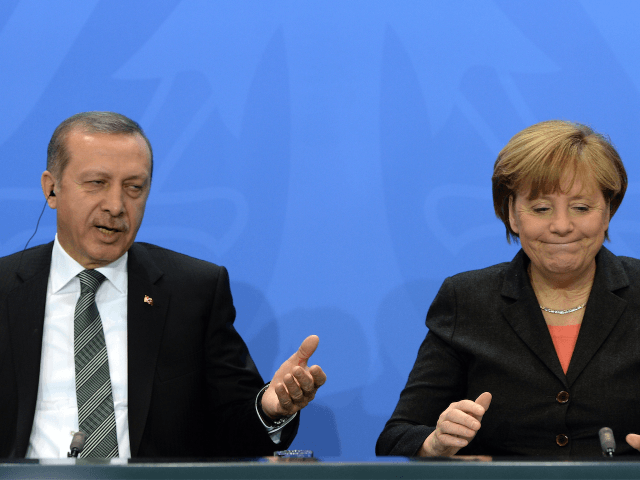Istanbul (AFP) – German Chancellor Angela Merkel told President Recep Tayyip Erdogan on Monday of her “deep concern” over the state of democracy in Turkey and voiced doubt that a plan to offer Turks visa-free travel to the EU would be implemented on time.
Merkel’s blunt comments after highly sensitive talks with Erdogan on the sidelines of the World Humanitarian Summit in Istanbul revealed the extent of surging tensions between the EU and the Turkish strongman over human rights.
The German leader took aim at a law that critics believe is aimed at evicting pro-Kurdish lawmakers from parliament and stressed to Erdogan that a democracy needed “an independent judiciary, an independent press and a strong parliament”.
“Of course, the lifting of the immunity of one quarter of the deputies is a source of deep concern. I expressed this to the Turkish president and we discussed these questions very openly,” she said.
“Not all my questions have been answered, we will have to watch developments closely.”
Turkey’s parliament on Friday adopted a highly controversial bill that would lift immunity for dozens of MPs.
The opposition pro-Kurdish Peoples’ Democratic Party (HDP) fears the legislation is aimed directly against its lawmakers.
The move could see dozens of HDP deputies facing criminal prosecution and losing parliamentary seats on accusations of supporting the outlawed Kurdistan Workers’ Party (PKK), which has waged a three-decade insurgency in the southeast.
Merkel added that she had not kept quiet about increasing concerns over the growing prosecution of journalists in Turkey, sometimes on charges of insulting Erdogan, and an erosion of freedom of expression.
– ‘Very radical decisions’ –
Erdogan made no comment after the talks and tellingly Merkel made her remarks not beside the Turkish president but later to her domestic press at the German consulate.
The Turkish president had earlier used his speech at the summit to complain Western states were not shouldering a sufficient burden in humanitarian crises.
And underscoring the tensions between Turkey and the EU, an Erdogan advisor warned that all accords with the bloc were now in danger.
“They should know that Turkey will make very radical decisions very soon as long as they maintain their attitude,” Yigit Bulut told state-run TRT Haber television.
Doubts are increasingly emerging over a deal for Turkey to limit the flow of migrants to Europe in exchange for incentives including visa-free travel to the passport-free Schengen area for its citizens by the end of June.
EU leaders are insisting that Turkey abides by 72 conditions before the visa exemption takes place, with a demand to change counter-terror laws proving particularly contentious.
The EU wants Ankara to narrow its definition of terror to stop prosecuting academics and journalists for publishing “terror propaganda”.
And Merkel warned the target was slipping.
“It is likely that by July 1, certain things won’t be put in place. In other words, the visa exemption (will not be granted), as some conditions will not have been fulfilled.
“I said clearly that the path towards the removal of the visa demand is based on 72 points which are not new and were presented in December 2013 by the European Union.”
– ‘End the confusion’ –
EU capitals have also been unsettled by the sudden resignation this month of prime minister Ahmet Davutoglu, who was widely seen in Brussels as a more amenable figure than the combative Erdogan.
Davutoglu was the main driving force behind the visa deal, with Erdogan always sounding more downbeat about the accord’s prospects.
The recent tensions are also hanging over the wider question of Turkey eventually becoming a member of the 28-nation EU.
With Turkish accession to the EU looming as an issue in Britain’s referendum on leaving, British Prime Minister David Cameron had quipped at the weekend it may take until the year 3000 before Ankara joins.
Incoming Turkish prime minister Binali Yildirim, a close Erdogan ally, has said it was time to “end the confusion” on Turkey’s accession process.

COMMENTS
Please let us know if you're having issues with commenting.